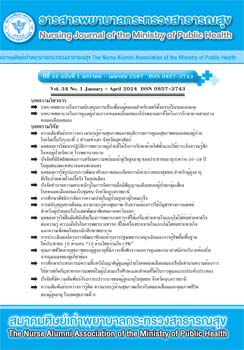Evaluation of the Project to Develop Skills in Emergency First Aid and Basic Resuscitation for 10 Million People “10 Million Thais Join Together CPR”
Main Article Content
Abstract
Emergency first aid and basic resuscitation outside of hospitals are crucial for saving lives of those facing with life-threatening emergency situations. This study is an evaluation research using the CIPP IEST model as a framework. The objective was to evaluate the project to develop skills in emergency first aid and basic resuscitation for 10 million people “10 Million Thais Join Together in CPR” organized by National Institute of Emergency Medicine. The participants consisted of 200 people who had completed the training of this project. The research tools included (1) a questionnaire to assess general information, (2) project performance evaluation form, (3) a questionnaire to assess satisfaction, and (4) in-depth interview questions. Quantitative Data were analyzed by descriptive statistics, and qualitative data were analyzed by content analysis. The results revealed that the mean scores of overall and each component of the project performance were at a high level. The average score of the overall performance was 4.63 (SD=.50). For each component of the project, the mean score of context was 4.78 (SD=42), while the mean score of input was 4.56 (SD=.53), and the mean score of process was 4.62 (SD=.56). After training, 100% of the participants had knowledge at a high level, and their average score of resuscitation skills was 93.14 (SD=2.41). The results from qualitative data analysis also supported that the participants had sufficient knowledge and basic lifesaving skills to perform emergency first aid and basis resuscitation in real situations. In addition, they were confident in sharing their knowledge with other people who want to learn at the centers organized by the National Institute of Emergency Medicine. According to the findings of this study, those who have completed the training of the project are competent to provide emergency first aid and basic resuscitation. Moreover, they can share their knowledge and skills with others. In conclusion, this project yields the emergency assistance at the scene of an incident. This can increase the chance of survival and reduce disability for victims.
Article Details

This work is licensed under a Creative Commons Attribution-NonCommercial-NoDerivatives 4.0 International License.
บทความและรายงานวิจัยในวารสารพยาบาลกระทรวงสาธารณสุข เป็นความคิดเห็นของ ผู้เขียน มิใช่ของคณะผู้จัดทำ และมิใช่ความรับผิดชอบของสมาคมศิษย์เก่าพยาบาลกระทรวงสาธารณสุข ซึ่งสามารถนำไปอ้างอิงได้
References
Photipim M, Laohasiriwong W, Thinkhamrop B, Sethasathien A, Hurst C. The effect of response time on survival among non-traumatic out of hospital cardiac arrest patients in Thailand. J Health Res 2016;30(1): 19-24.
World Health Organization. Thailand’s report situation of severe injuries year 2005-2010 data from injury surveillance (IS), Thailand supported [internet]. 2020 [cited 15 October 2020]. Available from: https://www.who.int/docs/default-source/thailand/roadsafety/thailand-status-against-12-global-road-safety-performance-targets.pdf?sfvrsn=92a24b06_4
National Institute for Emergency Medicine. Emergency first aid and basic life support training course for village health volunteer, prisoner health volunteer and community emergency volunteer 2020. Nonthaburi: NIEM. 2020. (in Thai)
National Institute for Emergency Medicine. Twenty-year national strategic plan for national institute for emergency medicine (2018-2037). Nonthaburi: NIEM. 2018. (in Thai)
Stufflebeam DL, Shinkfield AJ. Evaluation Theory, Models and Applications. San Francisco: Jossey- Bass; 2007.
Chow S, Shao J, Wang H. Sample size calculations in clinical research. 2nd ed. Champman & Hall: CRC;2003.
Skinner CJ. Probability proportional to size (PPS) sampling [internet]. 2014 [cited 15 October 2020]. Available from: https://onlinelibrary.wiley.com/doi/book/10.1002/9781118445112
Ravitch SM, Carl NM. Qualitative research: bridging the conceptual, theoretical, and methodological. 2nd ed. Los Angeles: SAGE; 2021.
Creswell JW, Baez JC. 30 essential skills for the qualitative research. 2nd ed. Los Angeles: Sage; 2021.
Pakkarato B, Sukjamnong S, Siwin A, Srisawang W, Chumnanborirak P. Development of a cardiopulmonary resuscitation model in Nadun hospital, Mahasarakham province. Journal of Emergency Medical Services of Thailand 2021;1(2):134-45. (in Thai)
Seangnhern U, Uppanisakorn S, Chinnawong T. Factors related to nurses’ knowledge and skills in cardiopulmonary resuscitation in Songklanagarind Hospital. JRN-MHS 2012;32(1):1-10. (in Thai)

